Overview
- Brief Narrative
- White linen tablecloth used by Shimon Beer's family in prewar Brno, Czechoslovakia. It was one of several tablecloths, (2012.342.6-9,11), preserved by his aunt Bertl in Great Britain. Brno was annexed and occupied by Nazi Germany in March 1939. Shimon, 19, left in December 1939 for Palestine, where he joined the Jewish Brigade of the British Army. His parents, Julius and Hildegarde, were deported to Theresienstadt ghetto-labor, and then to Auschwitz-Birkenau concentration camp, where they were murdered. His brother Pavel survived both camps.
- Geography
-
use:
Brno (Czech Republic)
- Credit Line
- United States Holocaust Memorial Museum Collection, Gift of Maud Michal Stecklmacher Beer
- Contributor
-
Subject:
Maud Michal Beer
- Biography
-
Maud Klotilde Stecklmacher was born on April 7, 1929, in Prostejov, Moravia, Czechoslovakia (Czech Republic), to Friedrich (Fritz ) Bedrich and Käthe Steiner Stecklmacher. Fritz was born on December 7, 1898, in Prossnitz to Jakub and Klotilde Stecklmacher. Fritz owned a clothing store and a wholesale business founded by his father that supplied accessories like buttons, buckles, and thread to local garment factories. Frtiz had four brothers, Emil, who died in childhood, Bruno, killed in WWI, Arthur, an architect in Prague, and Otto, who worked in the business in Prostejov. Käthe was born on March 26, 1908, the only daughter of Max and Steffi Steiner, owners of a wholsesale leathers goods and custom shoe business in Prostejov. Max’s brother, Josef, also worked in the family business. Josef was a widower, with a son, Gustav, born on December 29, 1925. Josef's and Max lived above the store with thier families. Fritz and Käthe married on March 25, 1928. Maud’s sister, Karmela, was born March 1, 1934. The families were very close, but not especially religious, attending temple only on Jewish High Holidays. But they were ardent Zionists: Fritz and Max belonged to Bnai Brith, Käthe and her mother belonged to the Zionist women’s organization WIZO and the children belonged to a Zionist youth organization, Tchelet-Lavan (Blue-White), and Maccabi sports club. They were affluent, assimilated German speakers. The sisters had live-in nannies and attended a public school with few other Jewish students.
In September 1938, Nazi Germany annexed the Sudetenland region of Czechoslovakia and on March 15, 1939, occupied Bohemia and Moravia where Prostejov was located. The occupation brought an increasing series of anti-Jewish repressions. Jews were not allowed to use public facilities, such as movies and parks, and in 1940, Jewish children could no longer attend public schools. The Jewish community offered classes in different homes, but by September 1941, Maud and Karmela were tutored at home. In spring 1941, the Steiner and Stecklmacher and other Jewish businesses were confiscated. Many Jewish residents were evicted from their homes because they were coveted by Germans and valuable personal possessions had to be turned over. Maud’s family was forced to move to the top floor of a small house already occupied by two other families. Among the other residents was 24 year old Hermann Tandler, who, with his mother and aunt, was a refugee from the Sudetenland. Maud had been introduced to him by her cousin Gustav. She and Hermann developed a close relationship which Maud’s father disapproved of because of Maud’s youth and because Hermann was not a Zionist. In September, all Jews were required to wear yellow Star of David badges on their clothing. Maud’s family received a large piece of cloth with printed stars. Käthe cut them out, sewed them to another piece of cloth, and attached snaps to the stars and their clothes to make them last longer.
In 1942, the men had to work in labor camps during the week. In May, transports to the Theresienstadt ghetto began. On July 2, 1942, the Stecklmacher and Steiner families were sent on the third transport AAm via Olomouc, arriving in Terezin two days later. Maud was assigned prisoner number AAm693. Maud, her mother, and sister were placed in Q802 block, her father in the Sudeten barracks, and her maternal grandparents in the barracks for the elderly. Maud found Hermann and their relationship continued and deepened; her family no longer tried to prevent it. Fritz was assigned to work in the cemetery and Käthe distributed mattresses. On September 17, 1942, Maud’s grandfather, Max Steiner, died, and her grandmother Steffi moved in with them. There were daily deportations from the camp to unknown destinations in Poland, feared by all the residents. Maud saw many friends and relatives get sent away, including her adored cousin Gustav and his father Josef. When Karmela contracted scarlet fever, she was placed in the quarantine infirmary and this protected the rest of her family from deportation temporarily. Hermann’s aunt, Regina Lagodzinsky, was deported on August 25, 1942. In October, his mother, Dora Tandler, received an order for deportation and Hermann would not let her go alone. He gave Maud an address in Berlin where they could meet after the war. After Hermann’s deportation, Maud agreed to be transferred to the girls’ house L410, where she lived with 23 other 13-year old girls. Her father Fritz worked for the ghetto administration reporting on barracks conditions and organized cultural programs to promote Zionist activities and the teaching of Hebrew. Learning was forbidden, but they received secret lessons in Czech history and science, and Maud could take books from a camp library. The girls got hot showers once every three months. They were hungry all the time and had to make a quarter loaf ration of bread last three days. Maud worked in a vegetable garden and sometimes stole some produce for her mother. In spring 1943, Fritz fell ill with pneumonia. He told Maud that the relatives who were sent away to Poland were not alive anymore. He asked her to keep it a secret and not tell her mother, and she never did. He recovered and resumed his nightly visits with his family. On May 31, 1943, Maud was told that her father, age 45, had died and his body cremated. It was not until late 1944 that Maud was told that he had committed suicide. About two years later, Karmela was part of a work crew of children and old people sent to throw the urns and ashes of the dead into the Eger River. On October 12, 1944, Maud’s grandmother, age 62, was deported to Auschwitz. Her mother Käthe was forced to work in a Glimmer factory, splitting the mineral mica which was used by the German military as an electrical insulator. Mica was essential to the war effort and the female prisoners in the factory were exempt from deportation, along with their immediate family. However, under the German rules, fourteen year olds were treated as adults and in October, Maud received a deportation order. Her mother and sister volunteered to go with her. The three were ready to board the train when a friend, Elinka, who worked for the ghetto self government, noticed them and told them to follow her. They did and then hid until the train left. Käthe asked the factory supervisor to reclaim her and Karmela and Maud was reclaimed by Kursovsky, the German manager of the agriculture department. In April 1945, death march survivors from others camps started to arrive in Theresienstadt. Among the arrivals were some who had been deported from Terezin to Auschwitz five months earlier, now unrecognizable.
On May 8, 1945, the Soviet Red Army reached the camp. After a short recuperation, the sisters, their mother, and an aunt, Lotte, returned to Prostejov. Many of their belongings were returned by the neighbors with whom the Stecklmacher and Steiner families had left them for safekeeping before their deportation. Maud returned to school in September 1945 and became active in the Gordonia-Young Maccabi Zionist movement. After the establishment of the state of Israel in May 1948, the Stecklmacher women decided to immigrate. They arrived in Tel Aviv in March 1949. Maud never gave up hope of meeting Hermann again. It was not until 1974 that she learned that he had been deported to Treblinka and murdered on arrival.
In spring 1950, Maud met some new arrivals from Czechoslovakia, Oskar Shimon Beer, his brother Pavel, and a friend. She married Shimon in January 1951 in Haifa. Shimon, born on February 27, 1925, in Brno, had left in December 1939 for Palestine, and served in the Jewish Brigade of the British Army during the war. His parents, Julius and Hildegarde, were deported to Theresienstadt, then to Auschwitz-Birkenau, where they were murdered. Pavel survived both camps. Maud and Shimon settled on a farm and had three children. Karmela married Jeno Weiss, (later Ben-Dom), also from Czechoslovakia, and they had two children. Käthe died in 1993, age 85. Shimon died in 2002, age 75. Maud later wrote a memoir of her experiences, “What Fire Can’t Burn.”
Physical Details
- Classification
-
Furnishings and Furniture
- Category
-
Household linens
- Object Type
-
Tablecloths (lcsh)
- Physical Description
- Square, white cotton tablecloth.
- Dimensions
- overall: Height: 31.000 inches (78.74 cm) | Width: 32.000 inches (81.28 cm)
- Materials
- overall : cotton, thread
Rights & Restrictions
- Conditions on Access
- No restrictions on access
- Conditions on Use
- No restrictions on use
Keywords & Subjects
Administrative Notes
- Legal Status
- Permanent Collection
- Provenance
- The tablecloth was donated to the United States Holocaust Memorial Museum in 2015 by Maud Michal Stecklmacher Beer, the wife of Shimon Beer.
- Funding Note
- The cataloging of this artifact has been supported by a grant from the Conference on Jewish Material Claims Against Germany.
- Record last modified:
- 2022-08-08 15:16:31
- This page:
- https://collections.ushmm.org/search/catalog/irn530316
Download & Licensing
In-Person Research
- By Appointment
- Request 21 Days in Advance of Visit
- Plan a Research Visit
- Request to See This Object
Contact Us
Also in Maud Michal Beer family collection
The collection consists of a sewing box, two pillowcases, six tablecloths, correspondence, documents, photographs, and a siddur relating to the experiences of Käthe Steiner Stecklmacher, her daughters, Maud and Karmela, and her family before the Holocaust in Prostejov, Czechosloavakia, during the Holocaust in Theresienstadt ghetto/labor camp, as well as to the experiences of Shimon Beer and his family in Brno and Prostejov and his service in the Jewish Brigade before, during, and after the Holocaust.
Date: approximately 1939-1950
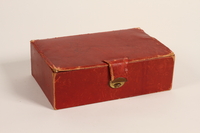
Red leather sewing box recovered postwar by a Czech Jewish woman
Object
Red leather sewing box made for Käthe Stecklmacher by her father Max Steiner and preserved by her daughter Maud. Max and his brother Josef operated a custom leather goods business started by their father. Käthe gave the box to non-Jewish neighbors for safekeeping before her July 1942 deportation from Prostejov, Czechoslovakia, to Ghetto Theresienstadt. She recovered the box when she returned to Prostejov in May 1945. On July 2, 1942, Käthe, her husband Fritz, her two daughters, Maud, 13, and Karmela, 8, her parents Max and Steffi Steiner, and her uncle and cousin, Josef and Gustav Steiner, were sent to Thereseinstadt. On July 28, Gustav, 16, and Josef were sent to Baranowicze, Poland, where they were murdered upon arrival. Max died on September 17. Fritz committed suicide in Terezin on May 30, 1943. Käthe was assigned to the glimmer factory, separating the mineral mica in flakes used for electrical insulation. Mica was essential to the German war effort, so she and her immediate family were protected temporarily from deportation to camps further east. Steffi was deported to Auschwitz and murdered in October 1944. Theresienstadt was liberated by Soviet troops on May 9, 1945. Käthe, Maud, and Karmela returned to Prostejov. They left for Israel in March 1949.
![Deutsche Gebete zum Gebrauche bei der häuslichen und öffentlichen Andacht [Book] Deutsche Gebete zum Gebrauche bei der häuslichen und öffentlichen Andacht [Book]](https://www.ushmm.org/media/emu/get?irn=530307&mm_irn=31349&file=secondary)
Deutsche Gebete zum Gebrauche bei der häuslichen und öffentlichen Andacht [Book]
Object
German prayer book inscribed for Maud Stecklmacher, 14, by her father Fritz in February 1943 when the family was imprisoned in Theresienstadt ghetto-labor camp in German occupied Czechoslovakia. It includes a photograph with black tape to mark his death in May 1943. On July 2, 1942, Maud, her parents, Fritz and Käthe, her younger sister Karmela, 8, her grandparents Max and Steffi Steiner, and her uncle and cousin, Josef and Gustav Steiner, were sent from Prosjetov to Thereseinstadt. On July 28, Gustav, 16, and Josef were deported to Baranowicze, Poland, and murdered upon arrival. Max died on September 17. Fritz committed suicide on May 30, 1943. Käthe was assigned to the glimmer factory, separating the mineral mica into flakes used for electrical insulation. Mica was essential to the German war effort, so she and her immediate family were protected temporarily from deportation to camps further east. Steffi was deported to Auschwitz and murdered in October 1944. Theresienstadt was liberated by Soviet troops on May 9, 1945. Käthe, Maud, and Karmela returned to Prostejov. They left for Israel in March 1949.
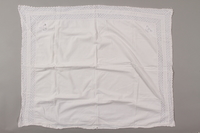
White lace pillowcase returned to Czech Jewish concentration camp inmates postwar
Object
Pillowcase originally from the home of Josef Steiner that was returned to Maud Stecklmacher, his maternal great niece, after the war by their non-Jewish neighbors Muzikant and Sevcik to whom he had entrusted it before his July 1942 deportation from Prostejov, Czechoslovakia. It was one of several linens saved and recovered (2005.342.5). Prostejov was annexed and occupied by Nazi Germany in March 1939. On July 2, 1942, Maud, 13, her parents Fritz and Käthe, her sister Karmela, 8, her grandparents Max and Steffi Steiner, and Josef and his son Gustav, 16, were sent to Theresienstadt ghetto-labor camp. On July 28, Gustav, 16, and Josef were sent to Baranowicze, Poland, where they were murdered upon arrival. Max died on September 17. Fritz committed suicide on May 30, 1943. Käthe was assigned to the glimmer factory, splitting mineral mica into flakes used for electrical insulation. Mica was essential to the German war effort, so she and her immediate family were protected temporarily from deportation to camps further east. Steffi was deported to Auschwitz and murdered in October 1944. Theresienstadt was liberated by Soviet troops on May 9, 1945. Käthe, Maud, and Karmela returned to Prostejov. They left for Israel in March 1949.
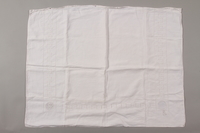
White pillowcase with lace and an MS monogram returned to Czech Jewish concentration camp inmates postwar
Object
Pillowcase originally from the home of Josef Steiner that was returned to Maud Stecklmacher, his maternal great niece, after the war by their non-Jewish neighbors Muzikant and Sevcik to whom he had entrusted it before his July 1942 deportation from Prostejov, Czechoslovakia. It was one of several linens saved and recovered (2005.342.4). Prostejov was annexed and occupied by Nazi Germany in March 1939. On July 2, 1942, Maud, 13, her parents Fritz and Käthe, her sister Karmela, 8, her grandparents Max and Steffi Steiner, and Josef and his son Gustav, 16, were sent to Theresienstadt ghetto-labor camp. On July 28, Gustav, 16, and Josef were sent to Baranowicze, Poland, where they were murdered upon arrival. Max died on September 17. Fritz committed suicide on May 30, 1943. Käthe was assigned to the glimmer factory, splitting mineral mica into flakes used for electrical insulation. Mica was essential to the German war effort, so she and her immediate family were protected temporarily from deportation to camps further east. Steffi was deported to Auschwitz and murdered in October 1944. Theresienstadt was liberated by Soviet troops on May 9, 1945. Käthe, Maud, and Karmela returned to Prostejov. They left for Israel in March 1949.
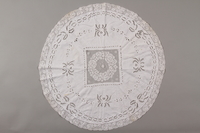
Circular white tablecloth saved by a by Czech Jewish refugee
Object
White linen tablecloth used by Shimon Beer's family in prewar Brno, Czechoslovakia. It was one of several tablecloths, 2012.342.6-11, preserved by his aunt Bertl in Great Britain. Brno was annexed and occupied by Nazi Germany in March 1939. Shimon, 19, left in December 1939 for Palestine, where he joined the Jewish Brigade of the British Army. His parents, Julius and Hildegarde, were deported to Theresienstadt ghetto-labor, and then to Auschwitz-Birkenau concentration camp, where they were murdered. His brother Pavel survived both camps.
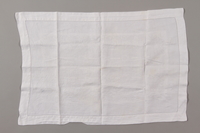
Rectangular white tablecloth saved by a by Czech Jewish refugee
Object
White linen tablecloth used by Shimon Beer's family in prewar Brno, Czechoslovakia. It was one of several tablecloths, 2012.342.6-11, preserved by his aunt Bertl in Great Britain. Brno was annexed and occupied by Nazi Germany in March 1939. Shimon, 19, left in December 1939 for Palestine, where he joined the Jewish Brigade of the British Army. His parents, Julius and Hildegarde, were deported to Theresienstadt ghetto-labor, and then to Auschwitz-Birkenau concentration camp, where they were murdered. His brother Pavel survived both camps.
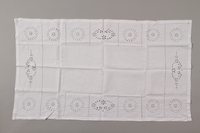
White cotton tablecloth with floral motifs saved by a by Czech Jewish refugee
Object
White linen tablecloth used by Shimon Beer's family in prewar Brno, Czechoslovakia. It was one of several tablecloths, (2012.342.6,7, 9-11), preserved by his aunt Bertl in Great Britain. Brno was annexed and occupied by Nazi Germany in March 1939. Shimon, 19, left in December 1939 for Palestine, where he joined the Jewish Brigade of the British Army. His parents, Julius and Hildegarde, were deported to Theresienstadt ghetto-labor, and then to Auschwitz-Birkenau concentration camp, where they were murdered. His brother Pavel survived both camps.
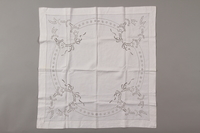
Square white tablecloth with floral motifs saved by a by Czech Jewish refugee
Object
White linen tablecloth used by Shimon Beer's family in prewar Brno, Czechoslovakia. It was one of several tablecloths, 2012.342.6-11, preserved by his aunt Bertl in Great Britain. Brno was annexed and occupied by Nazi Germany in March 1939. Shimon, 19, left in December 1939 for Palestine, where he joined the Jewish Brigade of the British Army. His parents, Julius and Hildegarde, were deported to Theresienstadt ghetto-labor, and then to Auschwitz-Birkenau concentration camp, where they were murdered. His brother Pavel survived both camps.
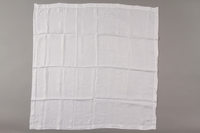
Square white cotton tablecloth saved by a by Czech Jewish refugee
Object
White linen tablecloth used by Shimon Beer's family in prewar Brno, Czechoslovakia. It was one of several tablecloths, (2012.342.6-10), preserved by his aunt Bertl in Great Britain. Brno was annexed and occupied by Nazi Germany in March 1939. Shimon, 19, left in December 1939 for Palestine, where he joined the Jewish Brigade of the British Army. His parents, Julius and Hildegarde, were deported to Theresienstadt ghetto-labor, and then to Auschwitz-Birkenau concentration camp, where they were murdered. His brother Pavel survived both camps.
Maud Michal Beer papers
Document
Contains photographs, identity documents from Israel, correspondence, and a memoir related to Simon Beer, originally of Brno, Czechoslovakia, and his extended family.



